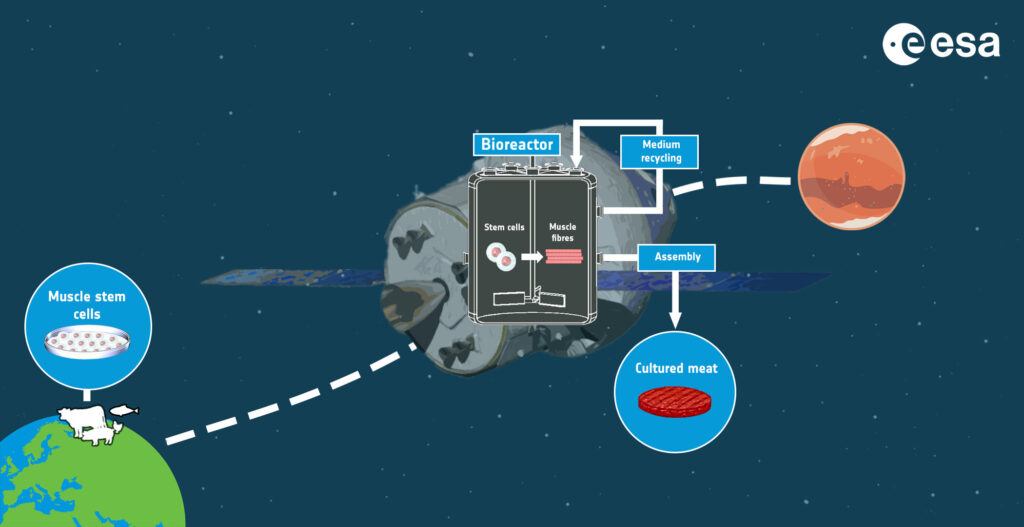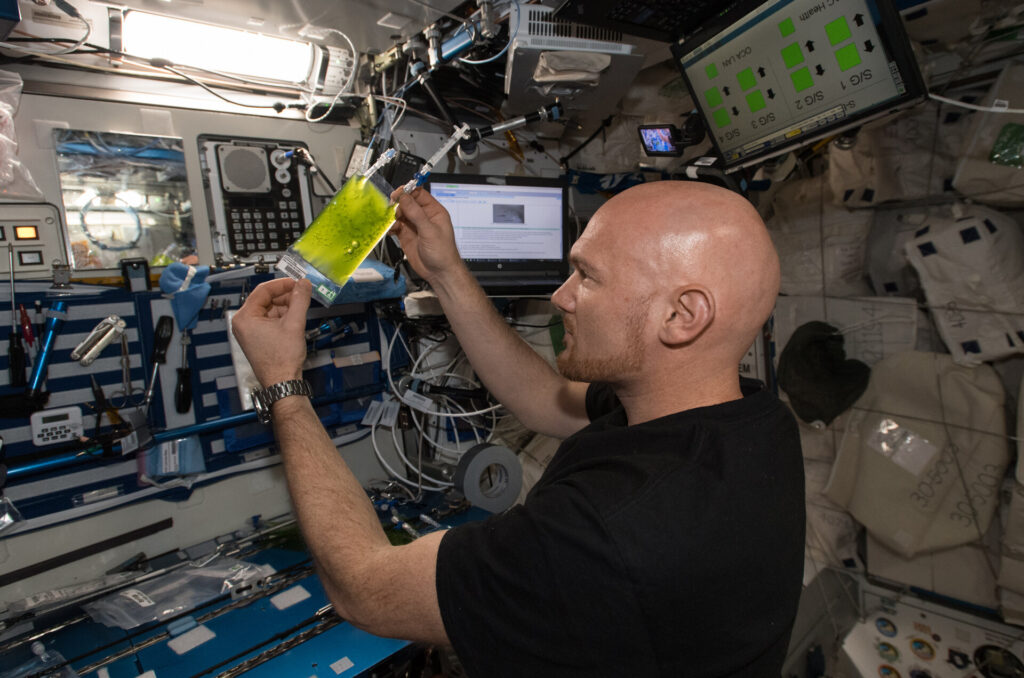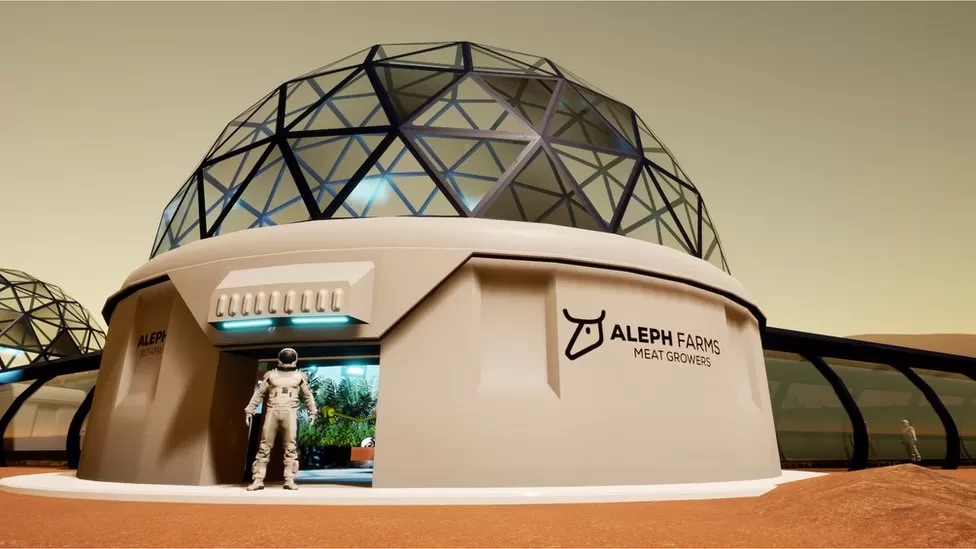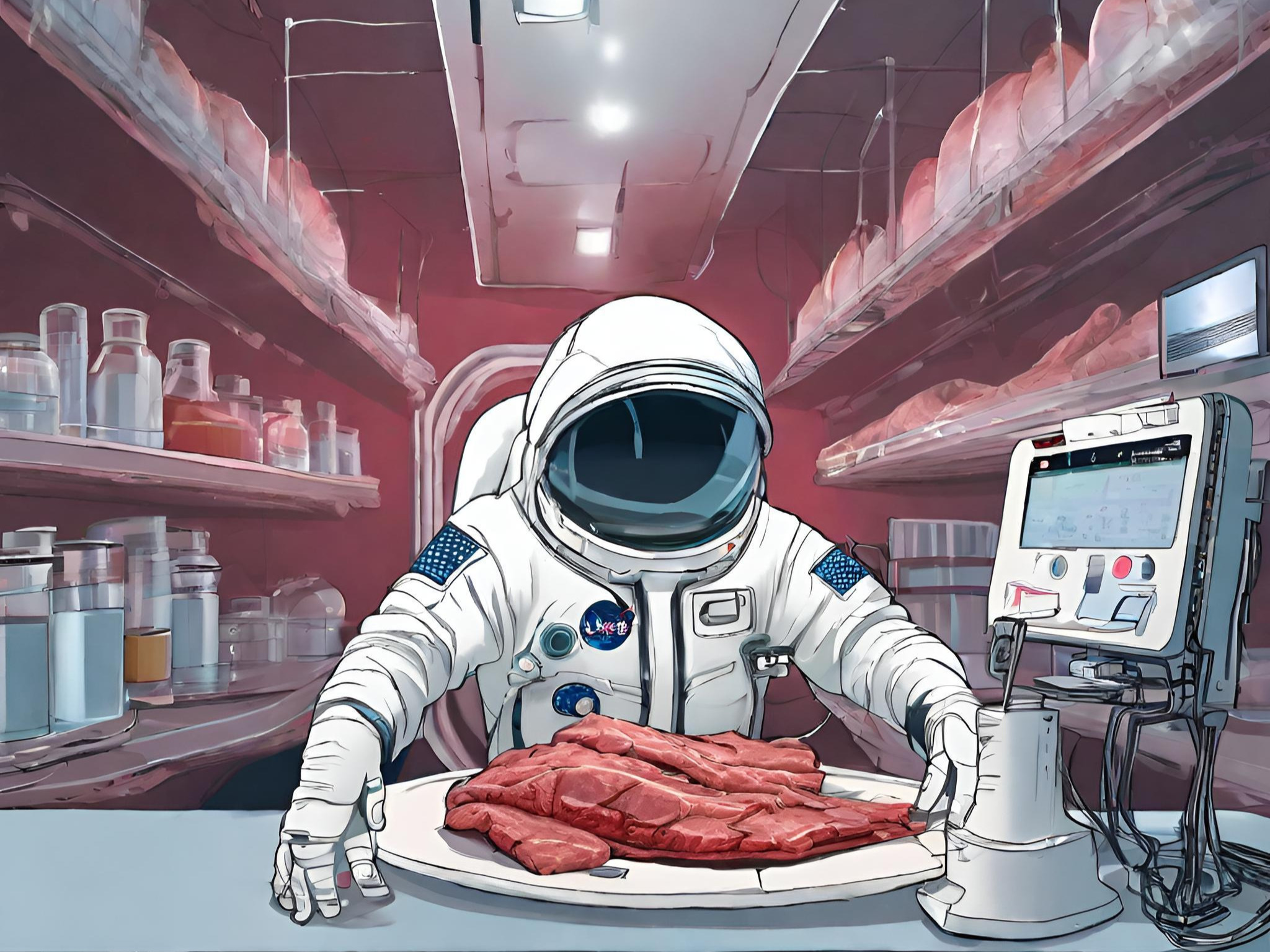Out of This World: Growing Meat in Space for the Better for the Planet
5 Mins Read
Two projects funded by the European Space Agency have looked at the viability of producing cultivated meat in space to provide more sustainable food for astronauts. The results are promising.
There is so much regulatory red tape around cell-cultured meat, it’s hard to know which country will follow Singapore and the US to allow people to try cultivated meat. It almost feels like the next best option would be to just disregard all countries and focus on another sphere altogether.
Past the exosphere, that is. Two research projects in the UK and Germany, supported by the European Space Agency (ESA), have been looking into ways to make cultivated meat in space. The two teams – made up of German company Yuri and Reutlingen University, and UK firms Kayser Space, Cellular Agriculture and Campden BR – have found promising results for astronauts.

Cultivating potential for future meat
The idea is that cultivated meat can provide an opportunity to produce fresh and familiar food products in situ. Typically, packaged supplies have a shelf life of two years, which makes them unsuitable for astronauts needing nutritious food on longer-term projects, explains ESA engineer Paolo Corradi. “Given the limited resources in space, growing fresh food in situ would be necessary to increase the resilience and self-sufficiency of a mission, and could also provide psychological support to the crew,” he says.
The British and German teams worked independently and compared existing plant- or algae-based protein alternatives in space with cultured meat in terms of nutritional value. Both came up with different production methods and bioreactor technologies. “After their analysis, both teams have come to similar conclusions and suggest that the idea of producing cultivated meat in space is not far-fetched and calls for further research,” says Corradi.
ESA is additionally developing tech that enhances bioprocesses and metabolic resources onboard spacecrafts, which could help with the cultured meat project. “ESA is investing significant efforts in researching advanced life support systems,” says Christel Paille, an ESA life support engineer and member of its cultivated meat team.
“We are creating ground prototypes to investigate, for instance, closed-loop systems that recover nutrients and recycle metabolic wastes. This could also be applied to cultivated meat production to recover the nutrient medium that we give to the cells.”
The agency adds that there’s still a lot of work to be done before astronauts can begin eating cultured meat. “It’s something that is still in its infancy, so we proposed a roadmap that outlines the steps required to progress the necessary technologies and fill current knowledge gaps,” says Corradi.
“This includes understanding how cells adapt to altered gravity and radiation,” adds ESA cultivated meat researcher João Garcia. “By using facilities available at ESA, we will soon start experiments to understand these effects.”

Cultured meat in space
ESA is far from the only space agency investing in alt-proteins like cultivated meat. In 2019, Israeli cultured meat leader Aleph Farms grew beef from bovine cells on the International Space Station, nearly 400km away from any natural resources. “We are proving that cultivated meat can be produced anytime, anywhere, in any condition,” said Aleph Farms co-founder and CEO Didier Toubia. “We can potentially provide a powerful solution to produce the food closer to the population needing it, at the exact and right time it is needed.”
This was followed by another experiment by Aleph Farms last year when it collaborated with SpaceX, whose crew members conducted experiments on microgravity’s effects on muscle tissue growth. They carried beef cells harvested on Earth by Aleph Farms.
NASA has already shown interest in the alt-protein space (pun unintended), with its Deep Space Food Challenge, whose finalists included startups making food using carbon dioxide, algae and fungal proteins, such as Finland’s Solar Foods, which uses gas fermentation to make single-cell proteins. Canada’s space agency is a collaborator on this project too.
NASA has actually been conducting cultured meat experiments since 2001, the same year Willem van Eelen, Wiete Westerhof and Willem van Kooten filed for a patent on cultivated meat production. It has partnered with fungal protein startup Nature’s Fynd as well, focusing on research to develop a micro-gravity biofilm-biomass reactor, which would bring a nutrient-dense vegan protein to astronauts.
Meanwhile, the Japan Aerospace Exploration Agency has been working with Tokyo-based Integriculture Inc. and the Tokyo Women’s Medical University on a project involving cellular agriculture and cultivated meat production in space. JAXA is part of Space FoodSphere too, a programme that includes cultured meat and microbial proteins.
And last year, Mexican cultured meat producer Micro Meat teamed up with US-based space parks developer Orbital Assembly to install meat production equipment in the latter’s space stations. Micro Meat said that working with cultivated meat in zero gravity will help it scale its protein systems on Earth.

Calling on the EU to step up
The ESA is now imploring the European Food Safety Authority – the EU’s regulator – to follow the lead of its counterparts in Singapore and the US and grant approvals to companies to sell cultivated meat. In the bloc’s framework, cultivated meat is classed as a ‘novel food’ and requires premarket authorisation.
Its stringent safety regulations have meant that there have been no known applications by cultured meat producers in the region. Aleph Farms did, however, file for clearance earlier this year in Switzerland and the UK (which retains the EU’s novel foods regulations post-Brexit).
“The feeling is that we are at the beginning of a process that could transform the industry, making the conventional meat production model obsolete,” says Corradi. “Developed countries have the historical opportunity to move away from farming and killing animals, being a very inefficient process to produce food, unsustainable for the planet, dangerous for our health and raising more and more ethical concerns among the population.”




